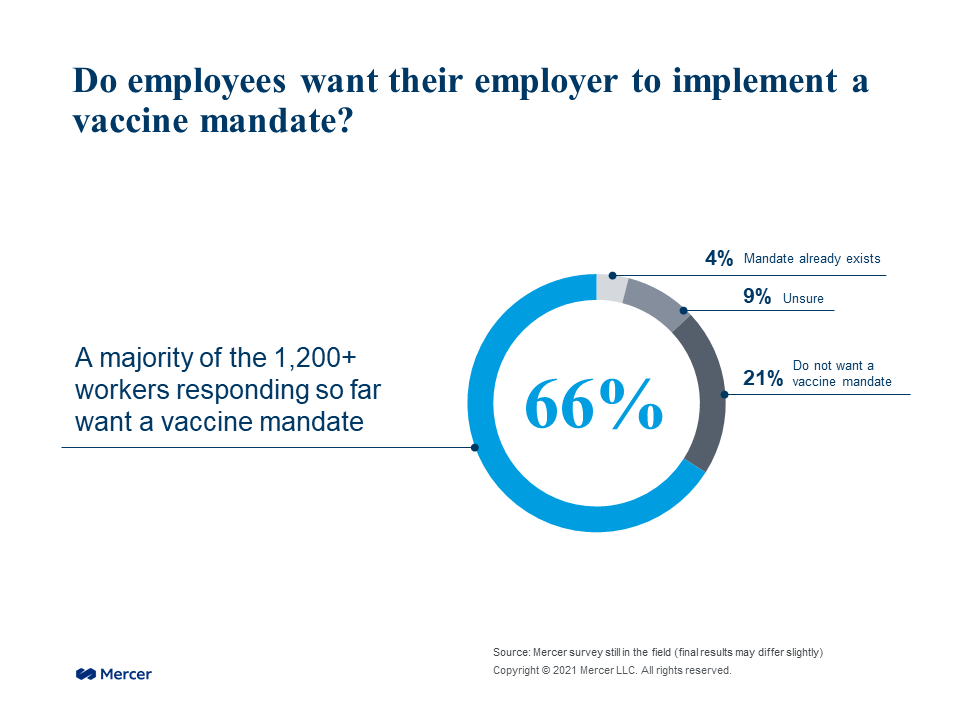New Survey: Do Employees Support Vaccine Mandates?

This week, the buzz over vaccine mandates got even more intense when the FDA issued full approval of the Pfizer vaccine and President Biden made a direct appeal to employers to require their workers to get vaccinated. Employers inclined to implement a mandate can now point to the FDA authorization, the President’s remarks, and court decisions upholding vaccine mandates to support this strategy.
In the weeks just prior to the FDA announcement, a Mercer survey of about 400 employers found that 14% had issued a mandate or were planning to. It’s likely that number will rise, although it’s difficult to predict by how much. Vaccination remains a divisive issue in the US, with emotions running high on both sides of the question. Employers are concerned that, on the one hand, a mandate could lead some workers to leave, while on the other hand, not having a mandate could make it difficult to get vaccinated employees (and customers) to return to worksites.
The employee perspective
But how do employees themselves feel about mandates? In an ongoing Mercer survey of employees across all industries and regions of the country, respondents were asked whether they would want their own employer to implement a vaccine mandate. As of Wednesday, a solid majority (66%) of over 1,200 workers who have responded so far said “yes,” while only 21% said no. Another 9% weren’t sure, and 4% said their employer had already implemented a mandate. It’s worth noting that Monday’s FDA announcement appeared to have some effect on employee preferences; those submitting surveys after the announcement were more likely to favor a mandate than those submitting before.

The percentage of employees who want their employers to implement a vaccine mandate seems roughly equivalent to the percentage of Americans of working age who are vaccinated. The median age of US workers is 42 and currently about 60% all Americans aged 40-49 are fully vaccinated and about 70% have received one dose. And, as with vaccination rates, the likelihood that a person approves of vaccine mandates rises with income and level of education, from 47% of high school graduates to 77% of those with a Master’s degree or more. Low-wage workers earning $30,000 or less were the least likely to approve of vaccine mandates, at just 32%. This would also be the group most likely to face practical barriers to getting vaccinated: not having time off from work, not having transportation, not having childcare, and perhaps fears about being charged when they can’t risk getting a bill.
If not a mandate, then what?
So where does this leave employers? True, a majority of workers would welcome a mandate. But 21% opposed isn’t an insignificant number. Further, given that the majority of low-wage workers do not support a mandate, employers in industries such as retail, hospitality and manufacturing that employ a large number of hourly workers will have much to contend with as they balance the vulnerability of this population along with the talent risks of such an action in the midst of a labor shortage. This has some employers turning to alternative strategies to encourage vaccination, such as a premium surcharge on health insurance. Other alternatives to vaccination include stricter masking protocols and regular testing for the virus, as well as restrictions on travel and client meetings. If feasible, employers can give the non-vaccinated the opportunity to continue remote work (they just need to be careful that they don’t give only the non-vaccinated work flexibility). One way or another, employers need to demonstrate that they have a safe workplace.
Considering a vaccine mandate?
If your organization is considering a vaccine mandate, whether you choose to watch and wait or take the plunge now you’ll want to read (or reread) last week’s post on compliance considerations and think through what would be involved in administering a mandate. The new CDC recommendation that people get booster shots after eight months may add a wrinkle to the process if it changes the definition of “fully vaccinated” – the CDC will likely issue guidance on this, although we don’t know the timing. Incorporating data on workers’ booster shots will add another column to the already complicated spreadsheet that employers need to demonstrate that they are running a safe workplace. But administrative challenges can be met, and may be a small price to pay if implementing a vaccine mandate saves lives and gets people back in their worksites, helping the economy recover and normal life return.
The question about vaccine mandates was asked as part of a larger survey designed to explore employees’ attitudes toward their jobs, making it less likely the results are biased by employees choosing to take the survey because they have a strong opinion one way or the other. The complete results of the survey will be released next month. We expect about 2,000 participants in total.
